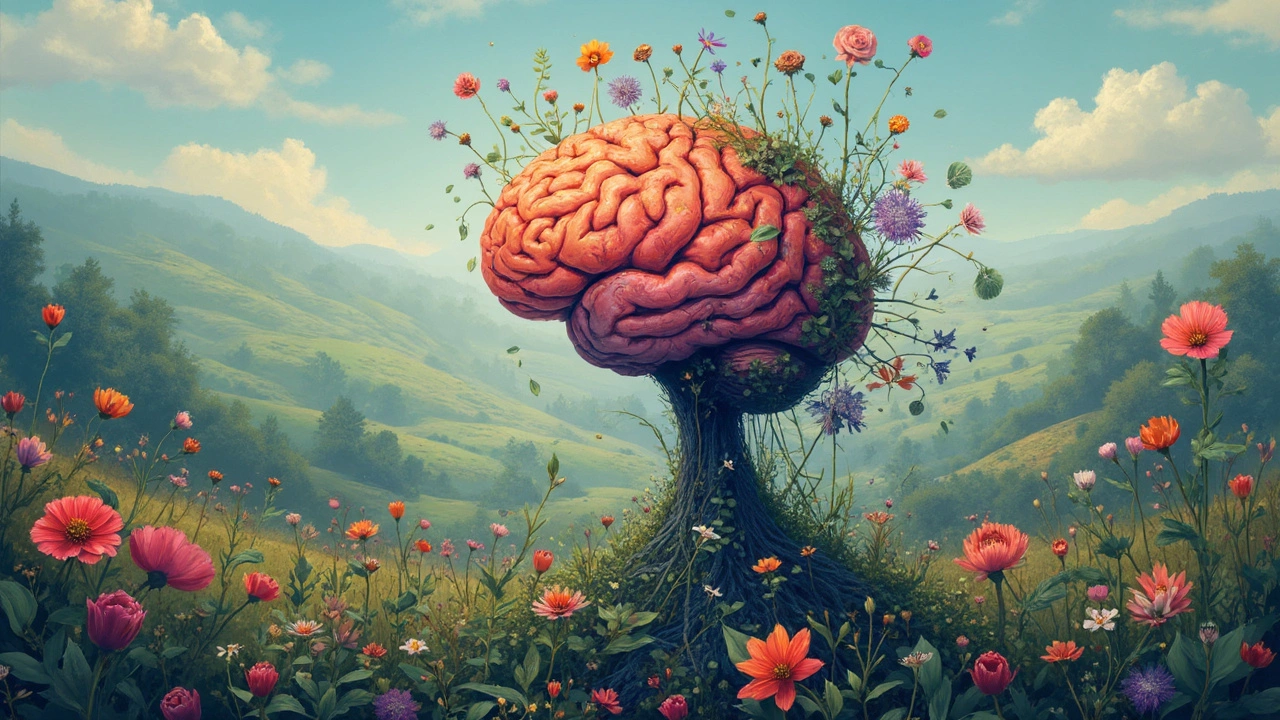Ever wonder why picking up a new skill feels like climbing a mountain as you age? It's not just you. There's actually a lot going on in your brain that changes over time.
First off, our brain cells, like everything else in the body, don't bounce back as quickly as they used to. Remember when you could spend hours trying out new dance moves without a second thought? Yeah, that changes. It's natural that as we get older, our brain's ability to process information and form new connections slows down.
But before you panic, there's more to the story. Alongside these natural changes, there are tricks to keep your brain in top shape. Simple things like staying active, eating right, and keeping socially engaged can make a world of difference. Let's dig into what's happening upstairs and see how you can keep those gears turning smoothly.
- The Brain's Journey Through Time
- Why Learning Slows Down
- The Impact of Lifestyle on Learning
- Tips for Keeping Your Brain Sharp
The Brain's Journey Through Time
From the moment we're born, our brains are in a constant state of growth and change. As kids, our brains are like sponges, soaks up everything around us, forming millions of new connections every day. This phase is why kids can learn languages or musical instruments so easily. But as we approach adulthood, things start to shift.
By the time we hit our 30s, the brain begins its gradual transformation. It doesn't mean we're getting dumber—far from it. What happens is kind of a trade-off. We start losing a bit of the flexibility that made us quick learners, but in return, we get better at things like problem-solving and analyzing information. Our brain works smarter, not necessarily faster.
Now, this journey doesn't stop there. In our 40s and 50s, the brain's processing speed slows down, and forming new memories can take a bit more effort. But don't worry, this doesn't spell doom for learning. Actually, it's a natural part of the aging brain. In fact, some researchers have found that older adults are better at seeing the big picture and understanding complex concepts because of their accumulated knowledge and life experiences.
Here's where it gets more interesting. By understanding these changes, we can tweak our approach to learning. For instance, breaking information into smaller chunks and allowing more time for practice can be game-changers. This way, your aging brain can keep thriving throughout your life.
Why Learning Slows Down
So, what's going on with our brains that makes learning seem like trudging through quicksand as we age? It mainly boils down to the changes in the brain's structure and the decline of certain functions.
One of the big reasons is the decrease in neuroplasticity. Neuroplasticity is our brain's ability to reorganize itself by forming new neural connections. When we're young, our brains are like sponges, eagerly soaking up everything. But as we hit our thirties and beyond, this plasticity starts to wind down, making it harder to adapt and learn new skills.
Then, there's the matter of processing speed. Older adults often experience slower processing speeds, meaning the time it takes to absorb, analyze, and respond to information increases. This can be why learning a new language or a hot new tech tool can feel like hitting a wall.
Now, not everything is on the decline. For instance, crystallized intelligence, or the ability to use the knowledge and experience we've gained over the years, continues to grow or stay stable. So, reading a complex book might not be as daunting as learning to play guitar.
However, other factors come into play too. Stresses of everyday life, from job pressures to family responsibilities, can take a toll on cognitive function. Plus, if you're not getting enough shut-eye or letting your body go, it can mess with your brain.
Here's a quick snapshot of some key changes:
- Reduced neuroplasticity
- Slower processing speeds
- Increased challenges with memory storage and recall
Demonstrating that not all aspects of brain function diminish equally, acknowledging these changes can help us find ways to keep learning exciting and, more importantly, achievable.

The Impact of Lifestyle on Learning
Alright, so you're getting older but that doesn't mean your brain has to feel it. It turns out that lifestyle choices can make a huge difference in how well you continue to learn. Let’s take a look at some choices that really matter when it comes to keeping your brain in great shape.
First up, let’s talk about staying physically active. Regular exercise doesn't just keep you fit, it also boosts brain health. Exercise helps increase blood flow to the brain, which can improve memory and cognitive function. Aim for a mix of aerobics, strength training, and flexibility exercises to cover all bases.
Next, eating right can also play a big role. A diet that's good for the heart is generally great for the mind too. Think lots of fruits, veggies, whole grains, and healthy fats—basically, the Mediterranean diet. It’s known to support cognitive function and keep you on your A-game.
Let’s not forget social connections. Being around other people and maintaining strong relationships keeps loneliness at bay and provides mental stimulation. Whether it's joining a club, volunteering, or simply meeting friends for coffee, these connections can help keep your mind engaged.
Now, here's an interesting fact. Poor sleep can be a major hurdle. Quality sleep is crucial because it helps the brain process memories and information from the day. Aim for 7-9 hours a night to keep everything ticking smoothly.
To put into perspective how these factors add up, check out this simple comparison:
| Lifestyle Factor | Impact on Learning |
|---|---|
| Physical Activity | Boosts cognitive function |
| Healthy Diet | Supports brain health |
| Social Interaction | Enhances mental engagement |
| Quality Sleep | Aids memory processing |
It’s not just about knowing this stuff, it’s about taking action. Put these tips into practice, and you might just find learning isn’t such a tough nut to crack after all. Keep up with these habits and see how they can make learning and staying sharp easier than you’d think.
Tips for Keeping Your Brain Sharp
Want to keep your brain buzzing like it used to? It might take some effort, but here are some straightforward tips to help you stay mentally agile as you age.
First, let’s talk about physical activity. It does more than tone muscles; it actually gives your brain a boost too. Regular exercise improves blood flow and oxygen to the brain, which can enhance memory and learning abilities. You don’t need to train for a marathon. Even a daily walk can make a big difference.
Next up, let’s not forget about what goes on your plate. Eating a balanced diet loaded with fruits, veggies, whole grains, and lean proteins can help maintain your cognitive functions. Omega-3 fats found in fish are especially great for your brain.
Socializing isn't just for extroverts. Engaging with others can help stave off feelings of isolation and depression, both of which can dampen cognitive abilities. So, make time to chat with friends, family, or even join local clubs or social groups.
Ever heard of the term "use it or lose it"? This plays out big time with your brain. Mental exercises can help keep your mind nimble. Whether it's tackling Sudoku, playing chess, or even learning a new instrument, the goal is to keep challenging your brain.
Finally, let’s not overlook the power of sleep. It’s crucial for memory consolidation—think of it as your brain’s way of filing away information.
- Exercise regularly – keeps blood and oxygen flowing to the brain.
- Eating well – omega-3s are your friend.
- Stay social – being around others can uplift your brain’s spirits.
- Challenge your mind – try puzzles, games, and new hobbies.
- Get enough sleep – let your brain get its rest.
Keeping sharp is a lifelong practice, but these steps can help steer your brain towards a brighter future.

